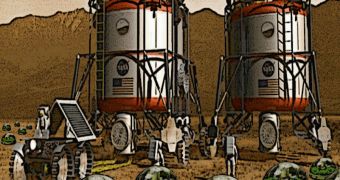If you really stop to think about it, setting up a colony on Mars would suffer most from lack of food, as everything would have to be hauled there from Earth. But this obstacle would disappear if crops were to be grown on the Red Planet directly.
The idea may seem farfetched at first, but it's really not. Naturally, nobody is talking about growing plants directly on the surface of Mars, as low temperatures, high radiation levels and the lack of atmosphere would render such efforts useless.
But models of how Mars' gravity influence the planet shows that water flows, nutrient dynamics and root-feeding microbes are in fact suitable for growing various types of plants.
“In terms of biogeochemistry and in terms of hydraulics, I’m pretty confident it could work,” explains University of Sydney biogeochemist Federico Maggi, the expert who conducted the simulations.
In science fiction books published decades ago, agriculture played a very small part in the overall establishing of a new colony, as writers fixed the food problem by thinking of machines that produce it on demand, out of the blue.
But astrobiologists have over the past few years come to admire, respect, and recognize the importance of, microbes living the soil, in direct communion with the plants that are their homes.
It's precisely this interaction that allows plants to protect themselves against invaders, or make better use of the scarce nutrients available at their locations.
Soil-based agriculture also has another added advantage, and namely the fact that it has already put behind it more than 12 millennia of human researcher, and millions of years of evolution.
By now, experts say, these plants and the small ecosystems they create in and around their roots, are perfectly capable for enduring the most hostile conditions.
“Mechanical systems are very reliable over short-term expeditions. But soil can control itself. In terms of operation error, it’s more reliable,” Maggi says.
“Plants provide more benefits in terms of energy and health. And real soil performs operations that other systems cannot,” he adds.
But the expert is the first to recognize the challenges associated with making growing plants on another planet a reality, Wired reports.
“If there’s low gravity, water will not flow down so quick. The transport of nutrients would also be slower. If transport of nutrients towards root microorganisms is not fast enough, it will suffocate them,” Maggi says in a paper published in the July issue of the journal Advances in Space Research.
The only major obstacle remains funding, critics say, as the adaptation problems could easily be overcome with appropriate amounts of grant money.
“We already have the engineering to put a base on Mars. If Bill Gates wanted to blow his whole fortune, he could do it right now,” says Ray Bucklin.
The expert, who is an agricultural engineer based at the University of Florida, is the author of a number of reports for NASA, concerning possible Martian greenhouse designs. He is also an advisor to the Mars Foundation.

 14 DAY TRIAL //
14 DAY TRIAL //